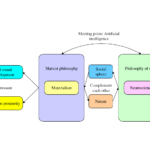Amanda Sayonara Fernandes Prazeres, Professor of the Intercultural Philosophy Specialization Course, Universidade de Passo Fundo (UPF), Passo Fundo, RS, Brazil.
 Philosophical activity is a historically intercultural activity. Or in the words of Ram Mall the phrase intercultural philosophy is tautological, since philosophy is by its very nature intercultural. (2014, p. 71). Furthermore, in the rapidly globalizing academic landscape, the challenge of engaging with philosophical traditions from diverse cultural backgrounds becomes increasingly pressing. As scholars, we are tasked not only with understanding these traditions, but also with incorporating them into our work in a way that respects their unique contexts while contributing to a broader philosophical dialogue.
Philosophical activity is a historically intercultural activity. Or in the words of Ram Mall the phrase intercultural philosophy is tautological, since philosophy is by its very nature intercultural. (2014, p. 71). Furthermore, in the rapidly globalizing academic landscape, the challenge of engaging with philosophical traditions from diverse cultural backgrounds becomes increasingly pressing. As scholars, we are tasked not only with understanding these traditions, but also with incorporating them into our work in a way that respects their unique contexts while contributing to a broader philosophical dialogue.
The article Breaking Barriers in Intercultural Philosophy: The Power of Empathy and Interrelationship, published in the journal Trans/Form/Ação (2024, vol.47, no. 2) addresses this challenge by exploring how concepts from Nishitani Keiji’s philosophy can serve as tools for overcoming dualistic and relativistic approaches to intercultural philosophy.
Intercultural philosophy, as a formal approach, emerged in the 1990s with the aim of fostering philosophical dialogue across cultures. This approach challenges the Eurocentric tendencies of traditional philosophy by recognizing that philosophical inquiry is a universal human endeavor, manifested in various ways across different cultures. However, this pluralistic approach raises significant methodological concerns. How can one study and learn from a philosophical tradition without imposing an external outlook, and how can we avoid the dualistic perspective that divides “us” and “them”?
This article begins by analyzing the limitations of comparative philosophy, which often falls into the trap of treating different philosophical traditions as essencially defined and isolated entities that can be evaluated against each other. Instead, the author advocates for an intercultural approach that seeks to understand these traditions on their terms, through the lens of empathy and mutual interrelationship. The author draws on two key concepts from Nishitani Keiji’s work to illustrate this approach: the concept of narau (learning) and the idea of reciprocal interpenetration (egoteki sōnyū).
Nishitani Keiji (1900-1990), a prominent figure of the Kyoto School, offers a rich philosophical framework that is inherently intercultural. His work is deeply influenced by both Buddhist thought and european existentialism, creating a unique synthesis that challenges the boundaries between these traditions. In this article, the author delves into Nishitani’s interpretation of narau (learning), which emphasizes an empathetic engagement with the subject of study. Unlike the notion of learning that separates subject and object, narau involves entering into the mode of being of what one seeks to learn from. This process requires the learner to relinquish preconceived notions.
This concept is particularly relevant to the practice of intercultural philosophy, where the goal is not merely to compare different traditions, but to engage with them in a way that allows for genuine understanding. By adopting an empathetic approach, scholars can move beyond the dualistic perspective that separates the self from the other and instead cultivate a sense of interconnectedness that is essential for meaningful intercultural dialogue.

Imagem: Pixabay
The article also explores Nishitani’s concept of reciprocal interpenetration (egoteki sōnyū), which challenges the traditional ontological distinction between subject and object. According to Nishitani, reality is not composed of isolated entities, but is instead a dynamic network of interrelated elements. This perspective, rooted in the Buddhist concept of śūnyatā (emptiness), posits that all things are interconnected and that their existence is contingent upon their relationships with other things.
In the context of intercultural philosophy, this concept offers a way to move beyond the limitations of dualistic thinking. Rather than viewing different philosophical traditions as separate entities that must be reconciled or compared, the concept of reciprocal interpenetration encourages us to see them as fundamentally interconnected. This approach allows for an understanding of philosophy that acknowledges the interdependence of different traditions and the ways in which they can mutually contribute to enrich each other.
The implications of Nishitani’s philosophy for intercultural philosophical practice are profound. By emphasizing empathy and interrelationship, the author argues that scholars can develop a method of inquiry that avoids the pitfalls of dualism and relativism. This method requires a shift in focus from the individual subject to the broader network of relationships that constitute reality. In doing so, it allows for a more inclusive and pluralistic approach to philosophy, one that recognizes the value of diverse perspectives while avoiding the imposition of any single framework.
Thus the article offers a compelling argument for the adoption of an intercultural approach to philosophical inquiry. By drawing on the work of Nishitani Keiji, the author provides a nuanced framework for engaging with diverse philosophical traditions in a way that respects their unique contexts while contributing to a broader dialogue. This approach, rooted in empathy and mutual interrelationship, challenges the dualistic and relativistic tendencies that have often characterized comparative philosophy and offers a path towards a more inclusive and pluralistic understanding of philosophy.
For scholars interested in the future of intercultural philosophy, this article presents a thought-provoking and timely contribution. It invites us to reconsider our methods of inquiry and to embrace a more empathetic and interconnected approach to philosophical practice. In doing so, it opens up new possibilities for understanding and engaging with the rich diversity of philosophical traditions that make up our global intellectual traditions.
To read the article, access
PRAZERES, F.S.A. Breaking barriers in intercultural philosophy: the power of empathy and interrelationship. Trans/Form/Ação [online]. 2024, vol. 47, no. 2, e02400274 [viewed 19 February 2025]. https://doi.org/10.1590/0101-3173.2024.v47.n2.e02400274. Available from: https://www.scielo.br/j/trans/a/qK4jJW953ZgdW7cD5cYf93d/
References
FORNET-BETANCOURT, R. Filosofía intercultural. Mexico City: Universidad Pontificia de Mexico, 1994
MALL, A.R. A Conceptual Clarification. Confluence: Online Journal of World Philosophies [online]. 2014, vol. 1, pp. 67-84 [viewed 19 February 2025]. Available from: https://scholarworks.iu.edu/iupjournals/index.php/confluence/article/view/514
NISHITANI, K. Religion and Nothingness. Los Angeles: University of California Press, 1982
PRAZERES, F.S.A. O problema de definir a filosofia japonesa: The problem of defining Japanese Philosophy. Modernos & Contemporâneos – International Journal of Philosophy [online]. 2022, vol. 5, no. 13, ISSN: 2595-1211 [viewed 19 February 2025]. Available from: https://ojs.ifch.unicamp.br/index.php/modernoscontemporaneos/article/view/4639
External Links
Trans/Form/Ação – Journal: Instagram | Facebook | Academia.edu
Como citar este post [ISO 690/2010]:


















Recent Comments